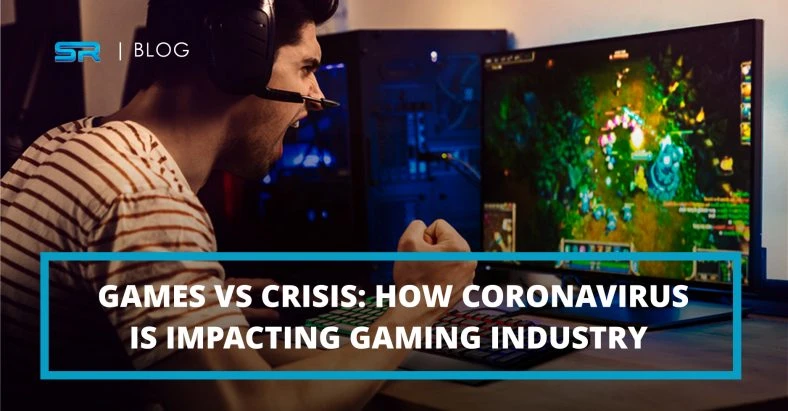Games vs. crisis: How coronavirus is impacting the gaming industry

As coronavirus keeps people at home, making offline entertainment unavailable, more users turn to online games. Gaming lifts people's spirits during the lockdown, helps fight boredom, and makes communication easier. Moreover, games that allow talking to friends and strangers are getting especially popular - since everybody lacks communication. However, the impact of coronavirus on gaming wasn't entirely positive - in-house development teams have to deal with the transition to remote cooperation tools, many major events were canceled and companies have to make changes in the investment plans due to impending global crisis. Let's take a look at how the last couple of weeks have been for the gaming industry and the future impact.
Cancellation of major gaming events - a crisis for developers
When the coronavirus epidemic officially became a pandemic, countries started actively forbidding mass events to help stop the spread of COVID-19 infection. Gaming conferences also took a hit. The most noticeable cancellations are the E3 and Game Developers Conference - the two biggest gaming events of the first half of the year.
E3 is one of the biggest video gaming events ever since the 90s, and it's the first time it was canceled. It's possible that E3 may be conducted digitally, but this news isn't confirmed yet. The same thing happened to Game Developers Conference - the organizations designed to postpone the event to the indefinite amount of time due to COVID-19. All attendees that will not be able to attend the postponed conference will get a refund. This is obviously a massive networking problem - usually such events provided the possibilities for game studios, big and small alike, to present their projects. Now, these global meetups won't be happening - and this could lead to a potential crisis for new releases.
Cancellation of gaming matches - a potential crisis for competitive sports
Another niche of gaming that has been hit hard by the COVID-19 outbreak is competitive gaming. Activision Blizzard, for instance, canceled all matches in March and April, and this decision will likely be prolonged. The same thing happened to the Call Of Duty competitions. All matches have been moved online due to coronavirus and streamed technology-driven digital environment. On the one hand, users now have more time to follow the matches but also, conducting live matches has been an essential part of the culture that is now put on hold. Having that in mind, games can be optimally positioned to come out stronger than ever before during this new era of Coronavirus pandemic. Sounds impressive, right? Let's delve into the details below!
How the gaming industry can benefit from the Coronavirus pandemic
Even though coronavirus caused created a certain crisis for game studios and their staff, it's reasonable to believe that the gaming industry will be the one to suffer the least from the outbreak. Even further, coronavirus quarantines attracted users' attention to online ways of entertainment. Even users who weren't gamers before started downloading and buying online games. Let's take a look at the definite opportunities that a COVID-19 pandemic and a global crisis presented gaming companies and developers.
Millions of gamers online during coronavirus quarantines: an opportunity for developers
The first driver of the increase of online gaming user base is school quarantine. Kids and young people are the main audiences of most games. The impact is obvious: with all of them are at home, gaming companies get a shot at attracting users that wouldn't otherwise be interested. According to the report of Valve Corporation, the company behind Steam, the number of players in the second half of March broke their records. On 15th, more than 20 million players were occupying the services, and this number is reported to grow day by day.
Free games were especially successful in attracting a user base. The newly released and free "Call of Duty Warzone", created by Activision Blizzard was downloaded 15 million times in 4 days - usually getting such numbers takes months. In addition to that, Newzoo's analyst anticipates an increase in at-home gaming across PC, mobile and console games and predicts the global games market will generate revenues of more than 189 billion U.S. dollars by 2022.
Growth of e-sports popularity: impact on streaming
COVID-19 led all sports federations to spot matches, throwing NBA, NHL, and soccer games into hibernation. Olympics and Euro-2020 have been postponed for the next year due to coronavirus. Sports fans don't have games to watch anymore - and they turn to online alternatives.
E-sports are thriving in this crisis. According to Twitch, the service's streaming statistics spiked by 31%. People are not only playing games but also watching gamers compete with one another. Even though the cancellation of the biggest competition couldn't have gone unnoticed, it's possible for e-sports to readapt - certainly much easier than for other sports.
The main challenge that esports companies and streamers face is internet connection issues. With everybody being online, the Internet speed risks to drop by a huge number, and streamers might not be ready for this.
Gaming stocks are going up during the coronavirus crisis
Initially, gaming stocks were also hit by the COVID-19 outbreak. The decline of the economy overall doesn't help stock growth - as the number of sponsors and partners declines. However, as the quarantine and lockdown progressed, gaming companies not only managed to become one of the most attractive investment options but even almost reached their pre-coronavirus crisis numbers. If the situation keeps up like this, the gaming industry will likely track increases in numbers.
Activision Blizzard stocks declined only by 11%, whereas the overall S&P 500's declined by 25%. The successful release of Activation Call of Duty and its quick rise to 15 million followers definitely helps the company's reputation and stock dynamics. Another telling example is shares of Electronic Arts. The company's revenue only fell by 13%, compared to 19 February - the last day of pre-coronavirus high on the market. There's an even more impressive stock statistic - Take-Two Interactive has seen only a 2% decrease since the crisis. Grand Theft Auto and Red Dead Redemption are among the most popular games during the outbreak.
Socialization through games
Whether you're self-isolating or working remotely, video games provide a way out for a lot of people who might not be able to see their friends and families during self-isolation. Moreover, video gaming has been among suggested methods for communication and socialization, according to many healthcare experts and mass media. BBC, The New York Times, and The Guardian defined gaming as one of the best ways to socialize during the COVID-19 crisis. Increased usage of multiplayer games like Fortnite backs up this theory. It looks like users took the advice to relax and communicate via online games really seriously. This opens gaming companies access to a new niche - communication-gaming, where a game is a way to connect a user to as many people as possible.
High demand for business games
Companies transferred their staff from offline to online environments, and that leads to changes in the education and onboarding process. Communication, training, and cooperation have to be reformed. Using existing tools isn't enough - teams need to interact with other members and keep themselves engaged. If the situation is to continue, we might find ourselves facing high churn out rates and struggle with finding new employees amidst COVID-19. To make the work process more engaging and interesting, companies can implement a variety of gaming solutions. Here are the three most common types of gaming that companies are adopting during the coronavirus crisis. Let's take a closer look below:
- Team building games: using intellectual and teambuilding online games help business owners to keep control over their employees' growth and skills. It's also a way to introduce diversity into the work routine and prevent burnout and internal crisis.
- Onboarding games: introducing new members is difficult. Even if you let people meet each other on virtual calls and chats, they might not be able to bond with a new employee well. Designing a custom online game for team onboarding, where the soft skills will be presented, allows business owners to connect to new employees better.
- Skills-training games: some fields aren't particularly suited to remote work but are now forced to readapt. If your niche typically features a lot of hands-on experience (manufacturing, transportation, etc.), you can keep your employees' skills intact by offering them interactive simulators. This can be a simple desktop or mobile game, or a complex AR/VR tool. So, whatever happens, keep your team ready.
Bottom line: What is the future of gaming during and after the Coronavirus pandemic?
Picking a field for investment and expansion during coronavirus crisis is difficult. The gaming industry provides a way out. You can build an online game in regards to trends, set by the lockdown, and minimize the negative impact. Focusing the product on communication and socialization is definitely an idea for consideration. If you run a business, implementing games to your workflow is a must-have. Not only will this help you to motivate your team and check up on their skills and growth, but also you can simplify the new hire onboarding process and welcome new members. Whatever industry you are working in, consider gaming - now it's a must-invest industry. The first step is finding a development team and talking about your project ideas. If you move in time, you might still be able to fit the growing trend.

